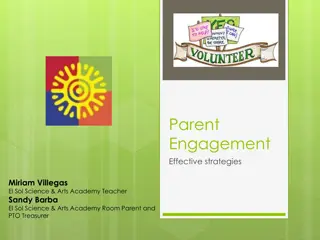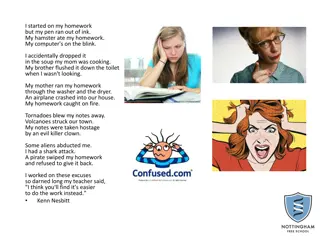
Effective Homework Strategies for Parents and Children
Discover essential tips for creating a productive study area, scheduling daily homework time, and overcoming common challenges like speeders and forgetters. Encourage children to take ownership of their homework with a structured routine.
Download Presentation

Please find below an Image/Link to download the presentation.
The content on the website is provided AS IS for your information and personal use only. It may not be sold, licensed, or shared on other websites without obtaining consent from the author. If you encounter any issues during the download, it is possible that the publisher has removed the file from their server.
You are allowed to download the files provided on this website for personal or commercial use, subject to the condition that they are used lawfully. All files are the property of their respective owners.
The content on the website is provided AS IS for your information and personal use only. It may not be sold, licensed, or shared on other websites without obtaining consent from the author.
E N D
Presentation Transcript
Helping your Child with Helping your Child with Homework Homework https://luthsped.org/2018/09/10/parent parent- -workshop workshop/
Proper Study Area Decide on place with your child Free from distractions, away from TV, noise, people coming in and out Also a place where parents won t need to use space during homework time or move the child to another space Make sure child has all needed materials in study area, including filled out assignment book/planner
Daily Homework Time Homework isn t something to be done after everything else or saved until the last minute Homework needs to be prioritized and scheduled so children know it s important Build homework into a child s routine and weekly schedule Rule of thumb: 10 minutes of homework/night per grade level
Daily Homework Time Pre-planned time set aside each day for child to do homework and all other activities stop during this time; phones get left in another room also! Plan ahead by looking at child s other activities and plan daily homework time accordingly, also depending on how long homework generally takes Have a written schedule with other activities and list homework time on schedule each time (see schedule handout) If homework gets completed appropriately before homework time is over, child can move on to something else
Daily Homework Time: Challenges Speeders Children who speed through work to get it done with little or no effort Forgetters Children who forget their homework at school and don t have materials needed for homework or forget they have homework at all Solution: Mandatory Homework Time Children have to use entire homework time to do some kind of school related activity, even if they ve forgotten their work Children learn that there is no advantage to finishing quickly or forgetting their materials at school
Children, not parents, do the homework
Children, not parents, do the homework When parents do homework for children, confirms the child s belief that he/she can t do it on their own and child will continue to feel overwhelmed Child may need encouragement and boost of confidence to start, but avoid doing the work for the child Be available to help the child or get him/her started, but let child know he/she is expected to do the work on his/her own
Children, not parents, do the homework If child is struggling or tells you he/she can t do it, try: Checking to make sure child has all needed materials Ask child to tell you what the assignment is and read directions together, making sure child understands directions Work on the first problem together, praise the child s efforts and let them work on other problems independently
Children, not parents, do the homework If child is struggling or tells you he/she can t do it, try: Be available to motivate and encourage your child to keep working and answer specific questions Break the assignment down into small steps that the child can do successfully Praise child s efforts at working independently and show confidence in ability to work independently
Children, not parents, do the homework Check in as child is working on homework to make sure directions are being followed and same mistakes aren t being made over and over and child ends up doing entire assignment incorrectly; check over homework when complete- not for perfection but to make sure directions have been followed as you did with check in If child still can not complete work almost entirely independently, contact the child s teacher. Homework is meant to be an independent activity for the most part, and teachers and parents can figure out solutions if this is not the case Game: give child 10 pieces of candy at the beginning of homework time; each time they ask for help (when it s not needed), they have to give you a piece of the candy; child can eat whatever is left at the end of homework time. Same can apply to staying on task: for each time you have to prompt child to stay on task, they have to give you a piece of the candy.
Motivation Consistently praise child s effort, not the grade necessarily Make your praise specific Super Praise One parent praises the child for something specific Parent praises the child in front of the other parent The other parent gives specific praise to the student
Motivation Give incentives as needed, but phase them out over time Use a spinner with different incentives in the spaces. As child finished homework independently, spins the spinner and receives that incentive (staying up 15 minutes later, gets to choose dinner, etc.) Could also use spinner with points in the spaces. Child needs to collect a certain number of points for a bigger incentive and again gets to spin the spinner after finishing homework independently
Motivation Homework Contract (see samples) Younger children or children who struggle more with homework should receive a reward more frequently than older or more independent students Grades K-3: reward every 3-5 days Grades 4-6: reward every 1-2 weeks Grades 7-12: reward every 2-4 weeks
Still not Working? Make sure your communication is assertive (no begging, bargaining, arguing with child to do homework). Use the broken record technique if necessary rather than arguing: continue to tell child that it s time to do homework rather than fall into the trap of arguing or bargaining Emphasize that homework is a priority in your house Avoid referring to specific assignments as pointless or stupid in front of the children (even if it s true!) Avoid talking negatively about the teacher or amount of homework in front of the children These reinforce negative ideas about homework and tell the child they shouldn t have to do an assignment Be consistent and back up words with action
Students with Attention Difficulties Use a timer of visual timer to break homework time into chunks, give break after timer goes off Forest App https://www.forestapp.cc/en/ Stop Go! https://itunes.apple.com/us/app/stop- go/id506877227?mt=8 Time Timers https://www.timetimer.com/products/time-timer- ios-app Visual Countdown
Students with Attention Difficulties Encourage child to look over work himself/herself when finished instead of relying on parent Help child break bigger projects into steps in their planner Reverse planning https://www.kqed.org/mindshift/50947/how-reverse- planning-for-goals-can-help-students-succeed-in-school; https://careervision.org/backwards-planning-great-strategy-find-hard- get-started/ ) Help with time management and prioritizing Easier to start with easy assignments to warmup or start with more difficult assignments when child has more energy? Leaving larger or harder assignments until later may not help a child with anxiety
Not Turning in Homework Make sure there is a routine at home After homework time, help make sure work gets in appropriate folder(s) and into backpack, ready for the morning. Homework is not considered complete until it is packed into backpack Have a checklist displayed at study area that student checks off to make sure homework goes into proper place
Not Turning in Homework Make sure there is a routine at school Similar checklist on the student s desk to remind them to turn homework in first thing in the morning May work to have student turn in ALL work to teacher first thing in the morning if there are different classes/teachers during the school day Set a timer/reminder for students that goes off when they get to school to remind them to turn homework in See if some homework can be emailed to teacher night before when it is finished Talk with teacher to meet the child where he/she is in the process: may have to take small steps to get homework turned in and where it needs to be
Homework Accommodations If homework continues to be an issue, discuss some options for accommodations with your child s teacher: Reducing the amount of time spent on a particular subject or overall homework time (parent signs off that child has spent the agreed upon amount of time working on homework) Using audio texts to reduce amount of reading (www.bookshare.org) for students with learning disabilities Having students dictate responses rather than write everything out (Dragon Dictation or Siri) Claro PDF https://www.claro-apps.com/claropdf/
Homework Accommodations If homework continues to be an issue, discuss some options for accommodations with your child s teacher: Help with planning bigger assignments, breaking them down into steps Reducing amount of print on a page Not penalizing for spelling errors Teacher provides study guides and class notes, highlighting only what will be on the test
Homework Accommodations If homework continues to be an issue, discuss some options for accommodations with your child s teacher: Extending deadline for work being turned in Alternate assignments that reinforce same skill Teacher or peer fills out assignment book, checks to make sure child has everything needed for homework packed to take home Extra set of textbooks at home
Resources https://www.understood.org/en/school- learning/learning-at-home/homework-study-skills Homework Without Tears by Lee Canter and Lee Hausner
Contact us! Kara Bratton, LSEM Resource Center Director kbratton@luthsped.org https://luthsped.org/2018/09/10/parent parent- -workshop workshop/






















